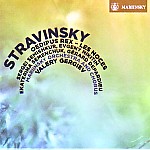Neither of these works lacks for fine recordings, but Valery Gergiev’s Les Noces is right up there with the best. It has the one quality that any great performance must have: the feeling that the singers are actually pronouncing a language rather than chanting random syllables. In this case, you can actually tell that the language in question in Russian, which is no mean achievement. Marry that with crisp playing from the pianos and percussion, and sensible tempos that offer plenty of excitement but also promote clarity of diction, and the result is tremendous, and very effectively recorded.
Now if only Oedipus Rex were that good, we’d be in business. But when the narrator (Gérard Depardieu) is the most interesting vocalist of the lot, then you know we’re in trouble. Tenor Sergei Semishkur probably is the best actual singer of the bunch, a bit whiny, but then that’s Stravinsky’s fault too. Ekaterina Semenchuk’s Jocasta starts off rough, then happily settles down for her big “oracle” aria; but it’s just not a very attractive voice. Baritone Evgeny Nikitin simply hasn’t the necessary range for Creon (he also sings the Messenger), which makes his faux-Mozart aria a chore.
Gergiev’s conducting is pretty hard-driving, too much so in the “Gloria” chorus preceding Jocasta’s entrance, particularly as the men of the Mariinsky could be more rhythmically precise. Still, I like this coupling. It really does show Stravinsky’s artistic range–and it had the potential to be even more impressive had the performances been more consistent. For Les Noces alone, one of Stravinsky’s greatest masterpieces and as major a landmark in 20th-century music as The Rite of Spring, you might want to consider hearing this.
































